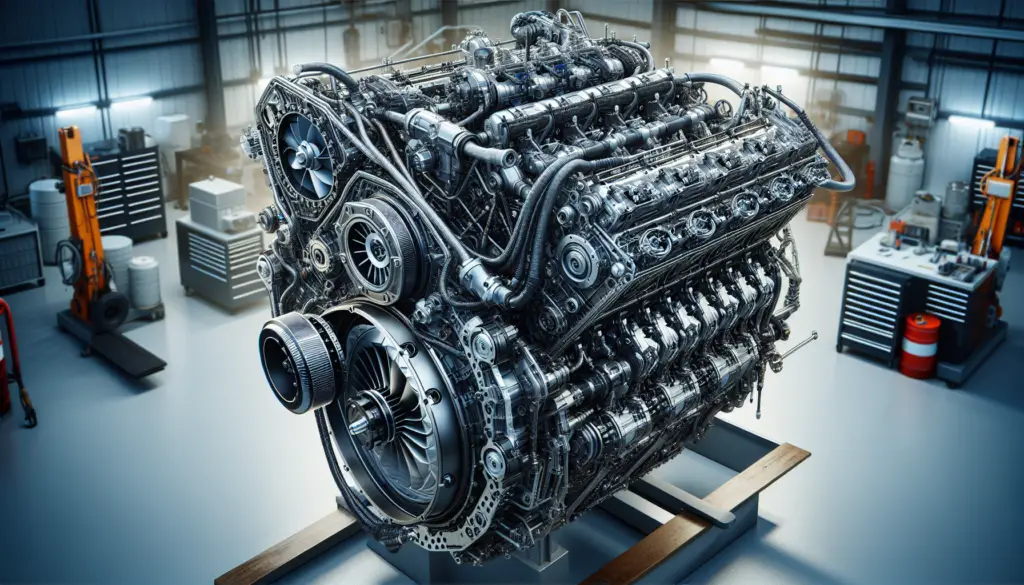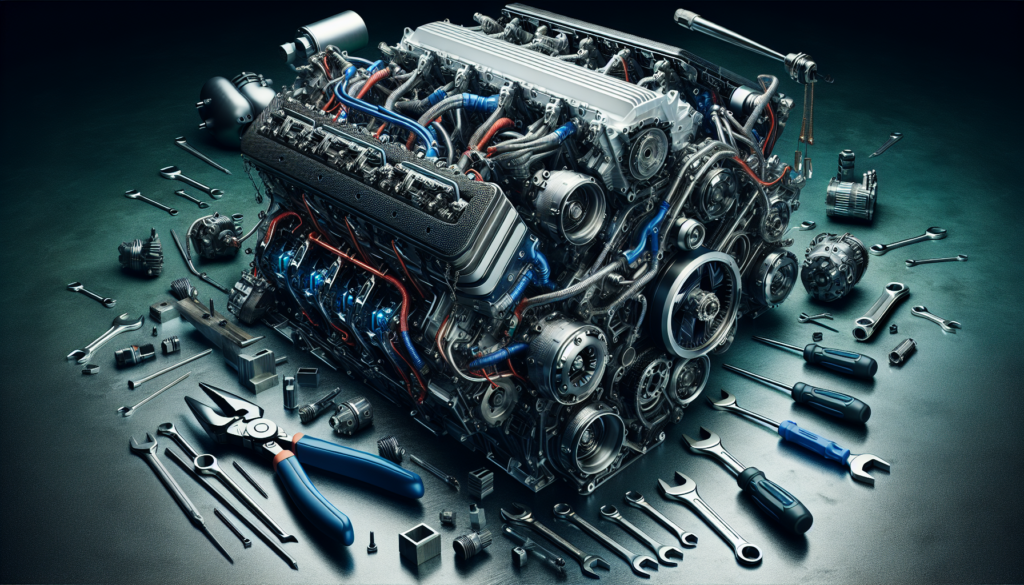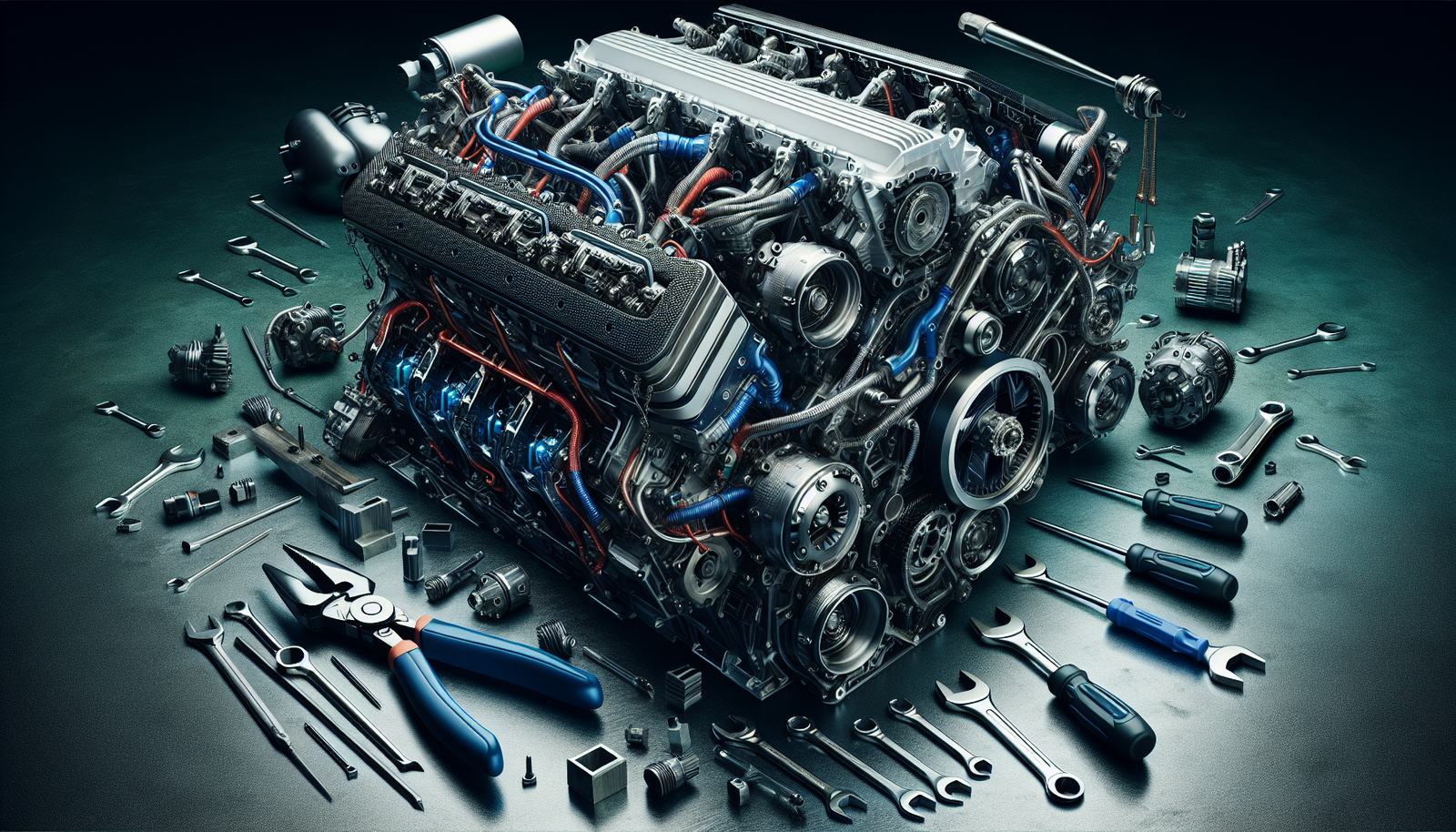Whether you are an avid boat enthusiast or a leisurely sailor, it’s essential to know how to optimize the performance of your boat engine. Being equipped with such knowledge allows you to reduce consumption, saving you a significant amount on fuel costs. In this article, you’ll find comprehensive insights into upgrading your boat engine for optimal fuel efficiency. You’ll gain access to expert advice and practical tips to help you enhance engine performance while maintaining fuel efficiency. Here’s a chance to make your boating trips not only enjoyable but also cost-effective.

Understanding Your Boat’s Current Fuel Efficiency
You may hear a lot about increasing the fuel efficiency of your boat, but the starting point has to be understanding the current fuel efficiency of your boat. This can be a multi-faceted approach involving three main elements: identifying the current fuel consumption, understanding the provided manufacturer’s information, and using available tools for measuring fuel efficiency.
Identifying the Current Fuel Consumption
First and foremost, you should closely monitor how much fuel your boat consumes during your outings. Keep a logbook of the fuel you add and the distance you travel. This way, you will be able to calculate your boat’s miles per gallon (MPG) and compare it with the manufacturer’s specification or with other similar boats.
Understanding Provided Manufacturer’s Information
Your boat’s manufacturer will have provided detailed information about your boat’s predicted fuel efficiency under different conditions. Although the factors affecting this number can vary, understanding these baseline expectations will help you make better decisions about your boat’s fuel consumption and efficiency.
Available Tools for Measuring Fuel Efficiency
There are various tools available that can help you measure your boat’s fuel efficiency more accurately. Some devices can be integrated into your boat’s existing systems, offering real-time data about your boat’s fuel consumption and efficiency, while others can give you computed average efficiency over time.
The Importance of Regular Boat Engine Maintenance
If you are serious about maintaining or improving your boat’s fuel efficiency, regular engine maintenance is crucial. Routine oil changes, regular filter replacement, proper fuel storage, and maintaining a clean engine are all factors that can significantly improve fuel efficiency.
Routine Oil Changes
Like all engines, your boat engine needs regular oil changes to run at peak efficiency. High-quality oils and regular changes will keep your engine running smoothly, reducing wear and improving overall fuel efficiency.
Regular Filter Replacement
Just as with oil, a clean engine runs more efficiently than a dirty one. Regularly replacing your air and fuel filters is vital and a simple and cost-effective way to maintain your engine’s highest possible level of fuel efficiency.
Proper Fuel Storage
To protect your engine and optimize fuel efficiency, proper fuel storage is essential. Storing fuel in clean, dry fuel containers can help avoid contamination that might reduce your engine’s performance.
Keeping the Engine Clean
Over time, engine parts can become dirty and clogged with debris. Keeping your boat’s engine clean helps to ensure optimal operation, reducing unnecessary fuel consumption and improving overall fuel efficiency.
Installing a New, More Efficient Boat Engine
If your boat’s fuel efficiency is still lagging, upgrading to a more efficient boat engine is an investment worth considering. It involves a careful cost-benefit analysis, understanding available efficient engine models, emphasizing the importance of professional installation, and ensuring continued efficiency through the maintenance of a new engine.
Assessing the Cost-Benefit Analysis
You need to weigh the initial purchase and installation costs against the long-term savings gained from improved fuel efficiency. Keep in mind, a more efficient engine could save you money in the long run despite the upfront costs.
Available Efficient Engine Models
Various engine models are designed for fuel efficiency. These engines usually come with advanced features such as direct fuel injection systems and more efficient combustion chambers. Taking the time to research and select the right engine model can significantly enhance your boat’s fuel efficiency.
The Importance of Professional Installation
A professional installation ensures that your new engine is installed correctly, operates smoothly, and achieves the maximum fuel efficiency it is designed for. While you may be tempted to install the engine yourself to save money, remember that it’s a complex process that can affect fuel efficiency if not done properly.
Maintenance of New Engine for Continued Efficiency
Investing in a more efficient engine is not a one-time solution to your fuel efficiency problems. You must commit to regular maintenance to ensure your new engine continues to deliver excellent fuel efficiency over time.

The Role of Propellers in Fuel Efficiency
Another factor that significantly impacts your boat’s fuel efficiency is the propeller. The impact it has on fuel consumption, choosing the right one, regular propeller maintenance, and knowing when and how to replace it can all contribute to significantly improved fuel consumption.
The Impact of Propellers on Fuel Consumption
Propellers play a crucial role in how efficiently your boat moves through the water. A propeller that’s too large or small for your boat can lead to inadequate performance and increased fuel consumption. Therefore, it’s essential to understand the impact of propellers on fuel consumption.
Choosing the Right Propeller
Choosing the right propeller is more than just picking one that fits your boat’s motor. You need to consider factors such as the size, pitch, material, and the number of blades to ensure it fits your boat’s specific requirements and delivers optimal fuel efficiency.
Regular Maintenance of Propellers
Like the engine, propellers also require regular maintenance to keep them at their most efficient. This can include tasks such as cleaning off marine growth, checking for nicks or cuts, and ensuring the pitch is still accurate.
When and How to Replace a Propeller
Your propeller won’t last forever. Knowing when and how to replace it is crucial to maintaining your boat’s overall fuel efficiency. Look for visible signs of wear and tear, such as pitting, cracks, or significant loss of paint or metal.
Fuel-efficient Cruising Speeds
When it comes to fuel efficiency, how fast you drive your boat matters. By understanding the optimal speed for fuel efficiency and maintaining consistent speeds, you can significantly reduce fuel consumption.
Understanding the Optimal Speeds for Fuel Efficiency
There’s a common misconception that slower speeds always mean better fuel efficiency. However, every boat has a particular ‘sweet spot’ where it achieves maximum fuel efficiency, often at three-quarters of its full throttle.
Common Misconceptions About Speed and Fuel Efficiency
Boating at full throttle can deplete your fuel tank quickly, while too slow can increase fuel consumption because of drag. Finding your boat’s optimal cruising speed is key to maximizing fuel efficiency.
Practices for Maintaining Consistent Speeds
Maintain a steady speed to improve your boat’s fuel efficiency. Rapid accelerations, decelerations, and constant speed changes can consume more fuel.
Weight and Its Impact on Fuel Efficiency
Just as with a car or plane, a boat’s weight has a considerable impact on its fuel efficiency. The lighter your boat, the less energy it needs to move through the water.
How Weight Affects the Boat’s Fuel Efficiency
Every extra pound on your boat can impact its fuel efficiency. Simply put, the more weight your boat carries, the harder its engine will have to work, increasing fuel consumption.
Strategies for Reducing Boat Weight
Consider strategies, such as carrying only as much fuel and gear as you require for your outing. Also, remove unnecessary items from your boat before each trip.
Balancing Weight for Optimal Performance
While reducing weight is vital, it’s equally important to balance the weight on your boat. An imbalanced boat can lead to increased drag, which can result in more fuel consumption.
Boat Hull Maintenance for Reduced Fuel Consumption
Your boat hull’s condition can significantly impact your fuel consumption. Routine cleaning, effective repair, and maintenance can result in improved fuel efficiency.
Impact of Hull Condition on Fuel Efficiency
A boat with a clean and smooth hull surfaces through the water easily, reducing drag and thereby saving fuel. Conversely, a dirty or damaged hull can increase resistance, leading to higher fuel consumption.
Effective Cleaning Practices
Cleaning your hull regularly can help maintain optimum fuel efficiency. Make sure to remove barnacles, algae, and other marine growth that can cause extra drag.
Hull Repair and Maintenance
If your hull is damaged, even slightly, it can reduce your boat’s fuel efficiency. Regularly inspect your hull for signs of damage and seek professional repair services when needed.
Optimal Motor Tune-ups for Better Fuel Efficiency
To optimize your boat’s fuel efficiency, it’s important to tune your boat motor regularly. This can greatly improve your fuel consumption.
The Role of Tune-ups in Fuel Consumption
Routine tune-ups can optimize your boat engine’s performance, leading to less fuel usage. They involve tasks like adjusting the carburetor, changing spark plugs, inspecting the ignition system, and adjusting the timing.
Frequency of Recommended Tune-ups
The frequency of tune-ups can vary based on the usage, model, and age of your boat engine. However, as a rule of thumb, your boat engine should be tuned up at least once a year.
Signs Your Engine May Need a Tune-up
Signs that your engine may need a tune-up can range from hard starting and unstable speed to lower fuel economy and overall loss of power. If you notice any of these signs, it’s time for a tune-up.
DIY Tune-ups vs. Professional Services
While some boat owners might opt for DIY engine tune-ups, it’s always a good idea to seek professional help. Professionals have the knowledge, equipment, and expertise to perform thorough tune-ups for better fuel efficiency.
Fuel Additives and Their Efficacy
Fuel additives are another way to increase your boat’s fuel efficiency, but they must be used with caution.
What are Fuel Additives?
Fuel additives are substances that you can add to your fuel to enhance its quality and performance. They can clean your engine, improve combustion efficiency, and prevent carbon deposits.
How They Can Improve Fuel Efficiency
Theoretically, fuel additives can increase your boat’s fuel efficiency by improving the overall combustion process, thus allowing your engine to extract more energy from the fuel.
Potential Downsides of Fuel Additives
While fuel additives can improve fuel efficiency, they can also potentially harm your engine if not used properly or if used excessively. It’s crucial to follow all manufacturer instructions when using these products.
Best Practices for Using Fuel Additives
The best practice when using fuel additives is to use them sparingly and follow the directions carefully. Only use additives specifically designed for marine use, and make sure they’re compatible with your boat’s engine.
Training for Fuel-efficient Boating
Finally, no matter how diligently you maintain your boat or how carefully you’ve selected its components, the person at the helm plays a crucial role in its fuel efficiency. Proper training can make all the difference.
Improve Driving Techniques for Fuel Efficiency
Specific driving techniques can significantly reduce fuel consumption. These may involve maintaining a consistent speed, optimizing your cruising speed, and avoiding aggressive accelerations or decelerations.
Value of Professional Training for Boaters
Professional training can teach you these techniques and more. Trained professionals can provide guidance based on your specific boat, helping you to achieve optimal fuel efficiency.
Self-education Resources and Their Value
Though professional training is recommended, self-education resources can be a helpful supplement. There are plenty of books, guides, and online forums dedicated to boating where you might find useful advice and best practices for fuel-efficient boating.
In conclusion, there are numerous ways to upgrade your boat engine for optimal fuel efficiency, whether through regular maintenance, weight management, hull care, or even the use of fuel additives. The key is to utilize a comprehensive approach, pairing physical upgrades with knowledge and training. With careful effort, you’ll be able to enjoy your boating adventures with a little extra peace of mind about your fuel consumption.


[…] in for a treat. This is your ultimate guide to boat engine fuel efficiency. Here, we’ll explore how to get the most out of your boat’s engine, how to improve fuel […]